Steel & Cast Iron Metal Chimeneas
Traditionally, chimeneas were made of clay, and while they're still a terrific option (check out our vast range of traditional Mexican clay chimeneas), robust metal chimeneas made of cast iron, steel, and other types of metal alloys are also popular among homeowners today, who want to add a unique style to their garden.
We currently have 20 to choose from:
-
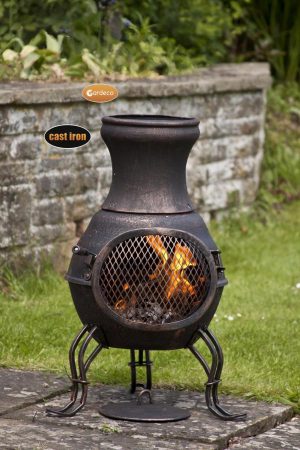
Billie Small Cast Iron Bronze Chimenea
£119.99 Quick View -
 Sale!
Sale!Tia Large Steel Chimenea in Bronze
Original price was: £169.99.£149.99Current price is: £149.99.Save: £20.00 (12%)
Quick View -
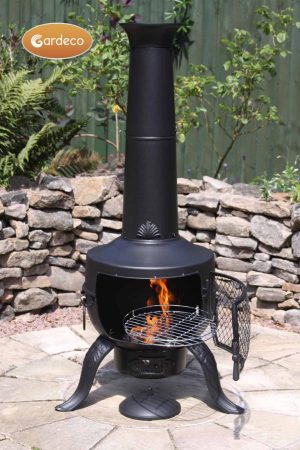 Sale!
Sale!Tia Large Steel Chimenea in Black
Original price was: £169.99.£159.99Current price is: £159.99.Save: £10.00 (6%)
Quick View -

Cono Black Chimenea With Copper Mouth Rim
£179.99 Quick View -
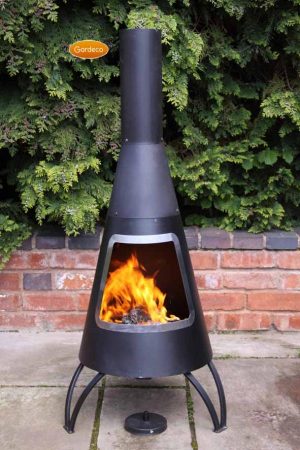
Cono Black Stainless Steel Chimenea
£179.99 Quick View -

Toledo Extra-Large Bronze Cast Iron Chimenea
£249.99 Quick View -

Lexie Small Bronze Steel Chimenea
£79.99Join Waiting List
Quick View -

Pot Belly Steel Chimenea with Central Mesh
£89.99Join Waiting List
Quick View -
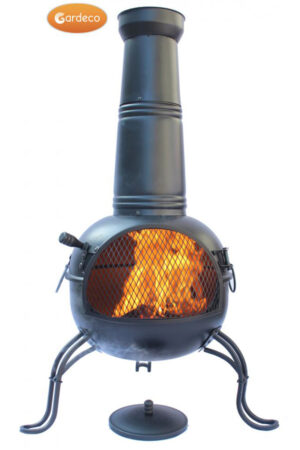
Kobie Large Steel Chimenea in Black
£119.99Join Waiting List
Quick View -
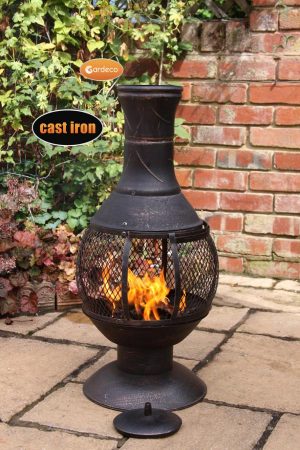
Opera Cast Iron Medium Chimenea with Central Mesh
£129.99Join Waiting List
Quick View -

Granada Medium Bronze Cast Iron Chimenea
£134.99Join Waiting List
Quick View -

Kaska Modern Steel Chimenea
£179.99Join Waiting List
Quick View -

Granada Large Bronze Cast Iron Chimenea
£179.99Join Waiting List
Quick View -
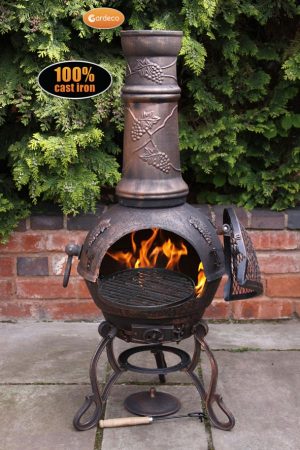
Large Bronze Grapes Toledo Chimenea
£199.99Join Waiting List
Quick View -

Granada Extra-Large Bronze Cast Iron Chimenea
£199.99Join Waiting List
Quick View -
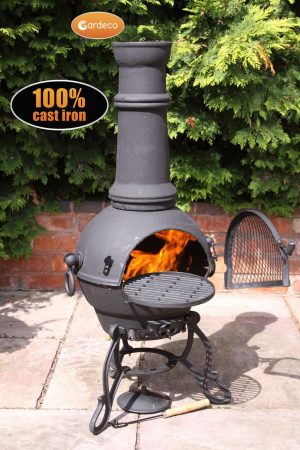
Toledo Cast Iron Chimenea Large in Black
£199.99Join Waiting List
Quick View -

Toledo Cast Iron Chimenea Large in Bronze
£199.99Join Waiting List
Quick View -

Toledo Extra-Large Black Cast Iron Chimenea
£249.99Join Waiting List
Quick View -

Toledo Extra-Large Bronze Grapes Cast Iron Chimenea
£249.99Join Waiting List
Quick View -
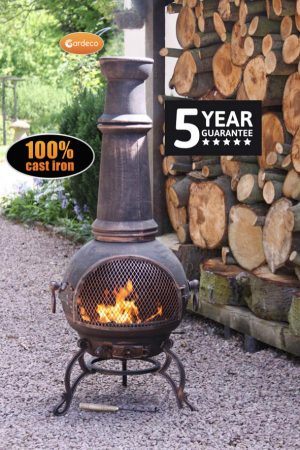
Toledo Jumbo Bronze Cast Iron Chimenea
£319.99Join Waiting List
Quick View
Steel & Cast Iron Metal Garden Chimeneas – Everything you need to know
Wondering if a steel or cast iron chimenea is a good addition to your garden? Want to learn more about this unique, multi-purpose garden stove? You’ve come to the right place.
Whether you’re looking for an alternative to a traditional grill or BBQ, you’re interested in a fire pit for your patio or garden, or you just want a unique conversation piece, a metal chimenea is a great option.
In this section, we’ll discuss everything you need to know about steel and cast iron chimeneas – read on, and see if a metal chimenea is a good investment for your garden.
Introduction To Steel & Cast Iron Chimeneas
A chimenea is a type of pot-bellied oven, first created in Mexico in the 1600s. They were used to bake bread, and also to provide heating, and were placed either indoors or outdoors. A chimenea has a large, bulbous bowl with a front opening, as well as a tall, narrow chimney that directs smoke up and into the air. This word is also often spelled “chiminea.”
Traditionally, this type of oven was made of clay. But today, metal chimeneas made of cast iron, steel, and other types of metal alloys are much more popular among homeowners who want to add a unique style to their garden.
What are the functions of Metal Chimeneas? Understanding the basics
Wondering what a chimenea actually does? There are a few different functions of a standard metal chimenea, including:
- Decoration – Chimeneas have a unique design that adds style and a focal point to your patio or outdoor space, and modern metal chimeneas often feature unique patterns and styling that add even more visual interest, making them a great decoration.
- Firepit – A chimenea makes a wonderful firepit for a cool evening, and unlike a traditional firepit, the chimney built into the chimenea directs smoke away from you, your family, and your guests.
- Cooking – The traditional purpose of a chimenea was food cooking – and modern chimeneas can be used for this, too! Some chimeneas come with built-in grills and accessories for cooking, and any chimenea can be used to cook.
What’s the difference between Steel & Cast Iron Chimeneas?
Wondering if a steel or cast iron chimenea is right for you? Not sure what the difference is between these two types of metal chimenea?
Pros of steel chimeneas
Steel chimeneas are made from a durable steel alloy, and are a great modern choice. Their benefits include:
- Lightweight – Steel chimeneas are typically thinner, making them a more lightweight option.
- Corrosion-resistant – Compared to cast iron, steel resists corrosion and rust more effectively.
- Minimal maintenance – Steel chimeneas do not require as much routine maintenance as cast iron, though they still must be maintained properly.
Cons of steel chimeneas
Here are a few of the drawbacks of steel chimeneas:
- Not as dense – This means that steel chimeneas do not hold heat as effectively as cast iron models.
- Higher cost – Steel is typically more expensive compared to cast iron.
- Easier to tip over – Because they’re more lightweight, steel chimeneas are a bit more top-heavy and easier to tip over.
Pros of cast iron chimeneas
Cast iron chimeneas use dense, heavy iron, and have a unique vintage and heritage look that looks great in your garden. Their benefits include:
- Excellent heat conduction – Cast iron heats up evenly and holds heat well, which is great for cooking.
- Very secure and stable – When properly installed, cast iron chimeneas will never move or tip over.
- Durable – The heavy-duty cast iron will last decades with proper care and maintenance.
Cons of cast iron chimeneas
Here are a few of the drawbacks of choosing cast iron chimeneas.
- They get extremely hot – Because they conduct heat very well, cast iron chimeneas can get very hot, requiring more space around the stove.
- More maintenance required – You will need to take more steps to clean a cast iron chimenea and prevent rust.
- Brittle, may break if dropped or knocked over – They’re heavy, so this is less of a concern, but the cast iron used in a chimenea is much more brittle than steel. An accident could break your cast iron chimenea.
What type of Chimenea is best for me?
If you want a more modern look with a bit less maintenance, a steel chimenea is probably your best bet. But if you prefer a more vintage style with more even heating – which is great for cooking – a cast iron chimenea will be a better option. It all depends on what your needs and your preferences are!
Traditional BBQs Vs. Metal Chimeneas for Cooking
Metal chimeneas are just as good as traditional BBQs for cooking. They add a unique, traditional flavor that you can only get by cooking over a wood fire, and they do not require any propane fuel or special charcoal – just burn wood normally!
They’re also very versatile. You can use a chimenea to grill meat, cook pizza, roast vegetables, and much more. Not only that, but unlike a BBQ, a chimenea also functions as a firepit and as a great piece of home decor, making it a great multi-purpose investment.



